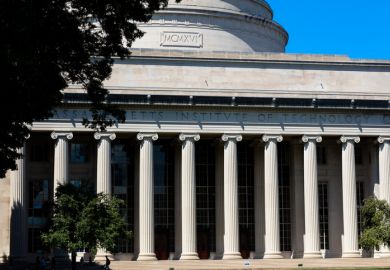There is an idea that, as for the visitor to a Monet exhibition, distance brings clarity that can be hard to find at close quarters.
After spending two weeks travelling – first to the US and then Switzerland – while back in the UK, Brexit lurched from crescendo to crescendo, I am not sure this always holds true.
Being in a different time zone neutralised some of the head-spinning speed of events, but the overarching impression remained the same: that the Gordian knot is getting tighter and tighter, and the point of it all is long forgotten.
For the US academics I met, the Brexit-related mayhem seemed equally unfathomable.
I was in New York for a THE event focusing on student success, a topic that we look at in depth in our cover story this week.
On this, there was a little more clarity among scholars and university leaders.
The forum heard about inequalities that begin well before students get to college, and persist well beyond, including into academic careers.
Raynard Kington, president of Grinnell College in Iowa, pointed out that despite the millions spent trying to improve diversity in science, technology, engineering and maths, the proportion of African American principal investigators holding prestigious National Institutes of Health grants has never been higher than 2 per cent.
His broader point was that when student success is limited, so is all that follows.
Perhaps the most extreme manifestation of this is found in data from the American Institute for Research, which calculates the cost of dropping out, measured by lost earnings, at $3.8 billion (£3.05 billion) – and that’s just for a single year’s national cohort.
And the implications go well beyond graduate earning premiums, taking in home ownership, marriage, retirement and gaps in life expectancy.
According to another dataset reported in a new book, The College Dropout Scandal by David Kirp, fewer than 60 per cent of college freshmen graduate in six years, with little change in these data in a decade.
Some of the responses to this problem are discussed in our cover story, including moves in some states to link public funding to college performance – a policy lever with inevitable pros and cons.
The risk posed to the marginal student – the one who may be at most risk of dropping out but who also stands to gain the most if given the chance and appropriate support – is one example of how easily higher education’s sensitive balance, and in this case its very raison d’être, can be knocked out of whack by inappropriate incentives.
Back in the UK, any clarity that comes with distance focuses one’s mind on the US system’s relationship with money – which provides the most powerful incentives, positive or negative.
At the start of the year, the system was dragged through the mud by a small but toxic group of bad apples who were found to be taking massive sums of money from wealthy parents to assist with the admission of their academically undeserving children.
The so-called Varsity Blues scandal has been followed in recent weeks by the financial ties exposed between the now deceased billionaire paedophile Jeffrey Epstein and academics and institutions at the very top end of the prestige spectrum.
In both cases, academia’s higher calling, and its supposed independence from such polluting influences, have proved to be insufficient armour when money is at stake.
Does this matter, beyond the individuals and institutions implicated? It does hugely – particularly in the US, but also beyond.
Polling by the Pew Research Center released last month found that only half of American adults think colleges and universities are having a positive effect on the country. A full 38 per cent say they are having a negative impact – up from 26 per cent in 2012.
This may reflect wider culture wars, but regardless threatens everything universities do and stand for.
Being seen as part of a hypocritical plutocracy, rather than as engines of research and education that drive social well-being and mobility for all, does untold damage – that much is crystal clear.
POSTSCRIPT:
Print headline: Role to right wrongs
Register to continue
Why register?
- Registration is free and only takes a moment
- Once registered, you can read 3 articles a month
- Sign up for our newsletter
Subscribe
Or subscribe for unlimited access to:
- Unlimited access to news, views, insights & reviews
- Digital editions
- Digital access to THE’s university and college rankings analysis
Already registered or a current subscriber?



